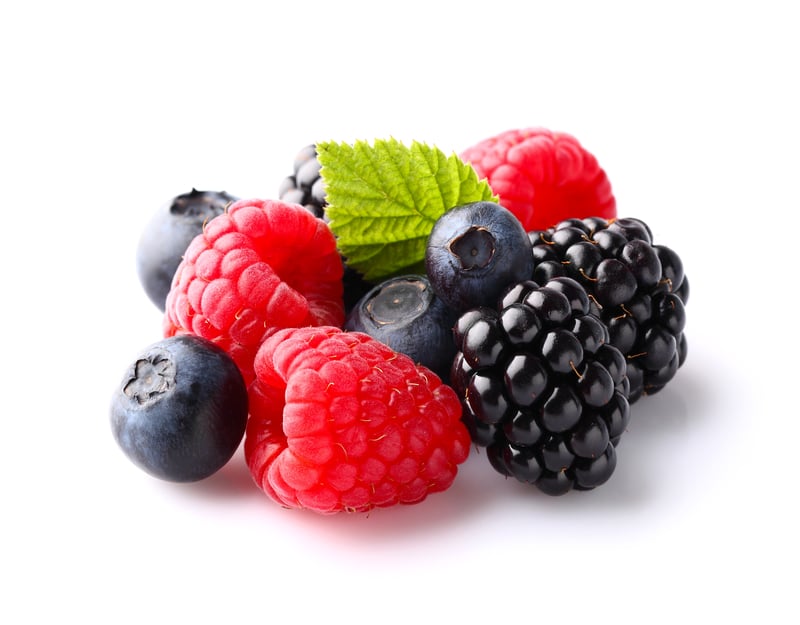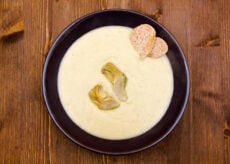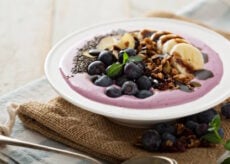Hungry Before Bed? Here are 18 Healthy Late-Night Snacks

How many times have you quietly, secretly, and perhaps even guiltily tip-toed into the kitchen to grab a late-night snack? How often have you found yourself elbow-, knuckle-, spoon-, or fork-deep in a bag or container before bed? If you’re anything like me, probably more often than you care to admit. While we’ve long been told that nighttime eating is bad news for your body and your waistline, recent research has revealed the old-school train of thought may be outdated. While eating large meals or the majority of your calories at night is probably not a good idea, the new-school perspective suggests that eating the right types of foods before bed can actually help you look, feel, and move your best. What should you eat at night? Discover our top healthy late-night snacks below!
Now, before you scroll any further and start grabbing healthy late-night snacks, ask yourself if you’re truly hungry, or are you reaching for something to eat because…
- You’re bored
- You’re stressed
- You’re tired
- You’re trying to stay awake
- You’re on a high (feeling really happy)
- You’re feeling low (particularly sad)
- You’ve been drinking (alcohol)
- You’re socializing
- It’s there
- That’s just what you do (it’s a habit)
In some instances, particularly stress and emotional eating, it may mean you’re trying to fill another void in your life by, well, filling your pie hole. Now, that doesn’t mean you’re a bad person; heck, I’ve been right there with ya.
In some cases, it comes down to your environment. Maybe it’s time to do a kitchen makeover and get rid of any late-night temptations. And as most people have experienced, the ol’ liquid courage (i.e., alcohol) tends to lower inhibition and often leads to poor food choices and overeating.
Of course, boredom, TV, and trying to figure out what to do with yourself between dinner and bed can all be inviting triggers for mindless snacking. But just because it’s something you’ve always done doesn’t make it right.
If any of the above scenarios ring true to you, the point here is to raise awareness, and you might also ask yourself, “How’s that working for you?”
The Truth About Late-Night Snacking
Eating late at night has a certain stigma to it and deservedly so. When you think about it, the typical late-night snacks are junk food, fast food, comfort foods, sweets, and the like—not exactly the healthy late-night snacks champions are made of. That’s problem number one, which feeds into problem number two.
Eating late at night can disrupt circadian rhythms, making it more difficult to fall asleep and/or sleep soundly through the night. Ironically, insufficient or poor-quality sleep make matters worse by messing with hunger hormones and contributing to decision fatigue. In other words, you’ll be hungrier, have more cravings, and your give-a-crap gauge will be on “low.”
While I’ll be sharing some ideas for healthy late-night snacks, I want to reiterate something I shared in another article (nothing like quoting yourself):
“Research has also shown that eating closer to bedtime (such as a late dinner or late-night snack) can have a negative effect on sleep quality. According to time-restricted feeding research conducted by Dr. [Satchin] Panda and others, it seems best to limit your ‘feeding window’ to less than 12 hours each day with most—if not all—of your food intake during daylight hours (e.g., before 8:00 pm).”
While consuming large meals or the majority of your daily food intake late at night is probably not such a good idea, an accumulating body of research suggests that small, nutrient-dense, low-energy-dense foods appear not only to not be harmful, they may be beneficial for various aspects of overall health, metabolism, performance, and body composition—in other words, how your body feels, moves, and looks. 1,2,3,4,5,6,7,8,9
For example, this emerging research has shown that certain healthy late-night snacks (eaten before sleep: following dinner but before bed), especially when combined with regular exercise, may help:
- Increase muscle repair and recovery (i.e., muscle protein synthesis)
- Improve whole-body protein balance (i.e., help build muscle)
- Increase next-morning metabolic rate
- Reduce next-morning hunger, appetite, and desire to eat
- Increase next-morning satiety (i.e., feelings of fullness and satisfaction)
- Increase next-morning fat oxidation (i.e., fat burning)
- Support weight management
Having said that, if you are leaning toward a late-night snack, then it’s a good idea to make the best choice you can. And topping the list of healthy late-night snacks are protein-rich foods, which have been taken center stage in most of the night-time feeding studies. In particular, pre-sleep protein appears to be especially important and useful for enhancing the benefits of regular strength training—increasing muscle size and strength. 10
The Top Healthy Late-Night Snacks
Opt For Protein
In particular, casein protein, which is one of the two main protein components (along with whey) found in milk, has garnered most of the attention as an ideal bedtime snack due to the fact that it’s a “slow-release” source of protein. And while late-night casein snacks have turned out to be quite promising, recent research also suggests that whey protein, whole-food proteins (like cottage cheese and milk), and even carbohydrate-rich snacks may also lead to favorable outcomes.
When it comes to protein, here are some of the top choices:
- Cottage cheese
- Greek yogurt
- Casein-containing protein powder
And if you happen to be vegan, have a milk sensitivity, or simply prefer a dairy-free option, then a plant-based protein powder would be a good choice.
Healthy Carbs?
When it comes to carbohydrates, nutrient-dense, low-energy-dense foods are going to be your best bet. Personally, I think fruits are a good option. They not only satisfy that hankering for something sweet, the following fruits may also how promote restful sleep, thanks to the fact that they contain relaxing compounds like melatonin, serotonin, and tryptophan:
- Cherries
- Kiwifruit
- Pineapples
- Bananas
Of course, you can’t really go wrong with berries (such as blueberries, strawberries, raspberries, and blackberries), which are loaded with powerful polyphenols, fiber, and flavor. And if you tend to feel a little stressed before bed, then oranges and grapefruits may be a go-to option for you. They contain vitamin C, which can help regulate the body’s stress response.
Now, if you’re looking for something a little more substantive and on the starchier side, I have a couple recommendations for you: potatoes and oatmeal. Say what?! I don’t think you need to be scared of carbs at night. In fact, I typically recommend a pretty significant portion at dinner (which is ideally at least 2 – 3 hours before bedtime).
In general, consuming some smart carbs in the evening can help promote weight loss, enhance compliance, and improve appetite management. Plus, carbs can help lower levels of the stress hormone cortisol and promote more restful sleep. There is a caveat here if you choose potatoes (boiled) or oatmeal, you must eat them cold, which increases the resistant starch content.
Go Nuts!
Now, if you’re looking for healthy late-night snacks that are crunchy (and perhaps a bit on the salty side), then I’d go with nuts or seeds. In particular, I’m a fan of walnuts, which contain melatonin.
The crunchiness of nuts and seeds offer some additional night-time advantages. For starters, chewing helps lower levels of stress hormones. Additionally, chewing suppresses appetite, increases feelings of fullness, and stimulates the release of satiety hormones. A good rule of thumb is to chew each bite 40 times.
Besides walnuts, here are some other options:
- Almonds
- Brazil nuts
- Cashews
- Pecans
- Pistachios
- Pumpkin seeds
- Sunflower seeds
Healthy Late Night Snacks: A Recap
Personally, when it comes to healthy late-night snacks, I like to put together a little cornucopia, if you will. I might make a protein pudding (with a scoop or two of Harvest), some banana slices, and some sliced almonds. Or, I might have some Greek yogurt with some kiwifruit and walnut pieces.
In general, the sweet spot for healthy late-night snacks seems to be in the 150- to 200-calorie range, and ideally, they should emphasize protein (20 – 40 grams seem to be ideal). Having said that, if you are going to reach for a bedtime snack, it’s also important to make sure your expectations are met.
Simply put, if you don’t satisfy your hankering, you’re going to keep eating. For example, if you prefer something sweet but go for a bowl full of veggies, chances are you’re going to find yourself right back in the kitchen searching for something else.
As always, enjoy healthy late-night snacks mindfully. Eat slowly. Take your time. Chew thoroughly. Be present. And really be thoughtful about why and how you’re eating.







